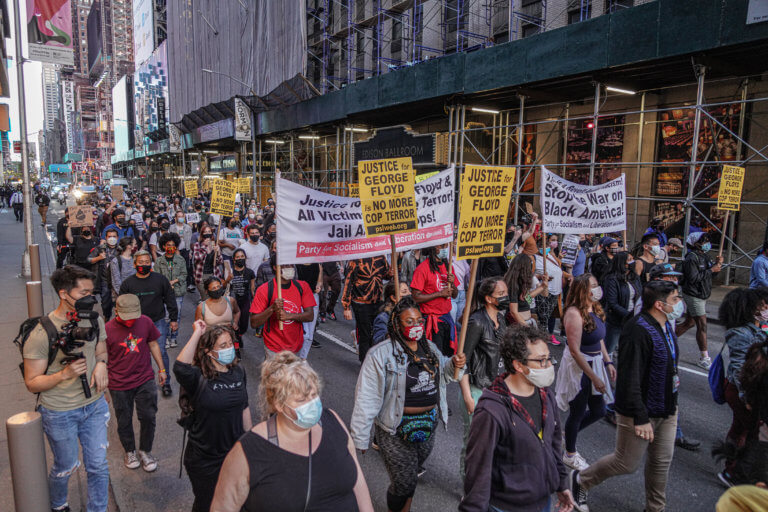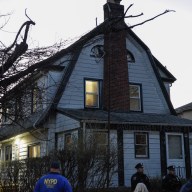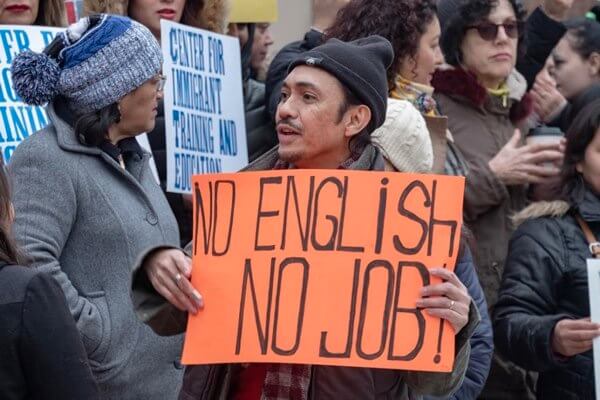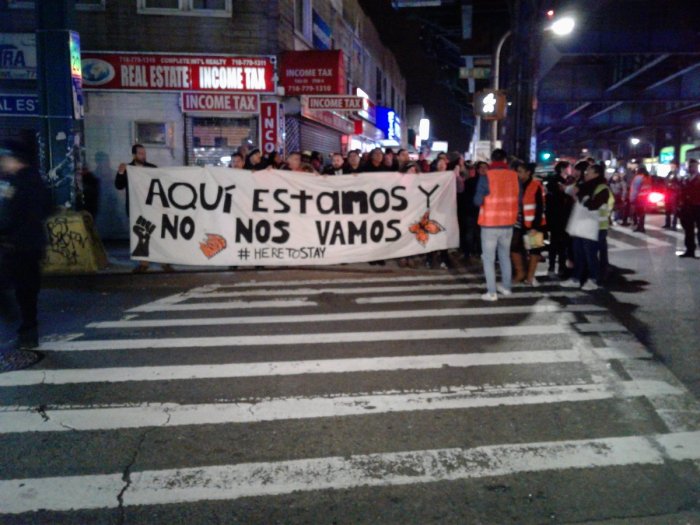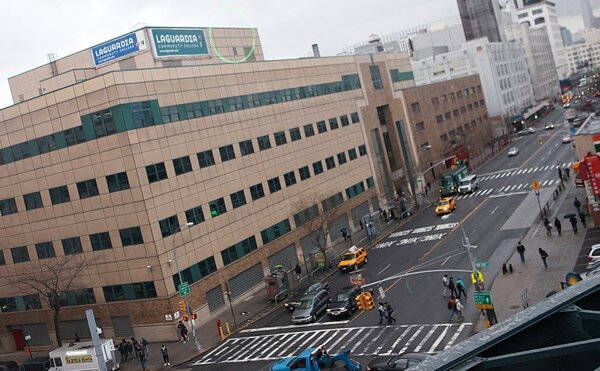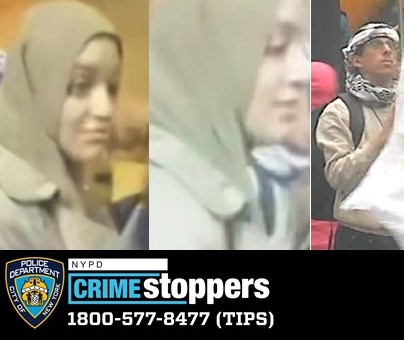Former Minneapolis police officer Derek Chauvin was convicted Tuesday of murdering George Floyd last May, and while many Queens elected officials and activists saw it as justice, they also emphasized that there is still much work to be done to not only hold police accountable, but also end the systemic racism entrenched in the country’s criminal justice system.
Chauvin, a white policeman, knelt on Floyd’s neck for more than nine minutes while Floyd, a 46-year-old Black man, was handcuffed and pinned to the ground. A harrowing video of the moment was shared on social media, sparking global outrage. Floyd’s killing, along with countless other victims of police brutality, then prompted the largest civil rights protests in decades.
After nearly a month of Chauvin’s trial, the jury deliberated in less than a day and found him guilty of second-degree murder, third-degree murder and second-degree manslaughter.
Queens Borough President Donovan Richards said that although the decision is “just and welcomed,” it’s “no cause for celebration” as “no verdict will reunite George Floyd’s children with their father or his siblings with their brother.”
“On its own, today’s ruling should not be momentous — we’ve all watched Derek Chauvin brutally murder another human being on camera. But while this trial has ended, with justice finally being served for an unarmed Black man killed by law enforcement, let this day be just the start of our shared fight to rid our criminal justice complex of the systemic racism that has infected it for centuries,” Richards said. “Until Black and brown lives finally matter equally in our society, our struggle continues — in the name of George Floyd, Daunte Wright, Adam Toledo, Breonna Taylor, Eric Garner, Sean Bell, Alton Sterling, Philando Castille and all those we have senselessly lost.”
Rockaway Assemblyman Khaleel Anderson said that while a form of justice was served, “we will not keep our eyes off of the never-ending fight for true police accountability.”
“As the youngest African-American serving in the [New York State Assembly], this verdict speaks to me [and] people who look like me and we matter,” Anderson wrote on Twitter. “When murder is committed, a gun and badge does not [equal] impunity.”
Southeast Queens state Senator James Sanders Jr. said “this is the first time” in his lifetime that he’s seen a white police officer convicted of killing a Black man. Sanders noted that although Chauvin faces up to 75 years in prison, he may only get 12 years as a first-time offender — “and that is not nearly enough time.”
“I think that today we have seen a strike against the racism that exists in our country particularly as it relates to law enforcement and Black and brown people,” Sanders said. “However, we must continue to fight. The battle is not over. This is one small victory. There will be many more victories needed before we see true change.”
Other elected officials and activists emphasized that the verdict is not justice, but accountability. Experts have noted that it’s rare for police officers who kill people to be charged with a crime and more so for them to be convicted of murder.
“The perpetual pain of Blacks in America from a wound that never really has time to scar over, much less heal, before it is again ripped open by a headline, a video, a verdict,” Public Advocate Jumaane Williams said. “So while I’m relieved the jury reached the right decision, that Derek Chauvin will face consequences, I’m not celebrating. It’s hard to truly breathe a sigh of relief when George Floyd cannot. Derek Chauvin is guilty, but George Floyd is dead. That this verdict was ever in doubt, amid overwhelming evidence, is itself evidence of the reality that to some, Black lives matter less than white privilege.”
Williams added that while the movement for justice and equity that swept the country has delivered progress in some areas, “most are overdue and underdelivered, falling far short of the need to fundamentally redefine public safety.”
Queens Liberation Project (QPL), a collective of activists who organize protests and mutual aid in the borough, recently held a demonstration for Daunte Wright, a 20-year-old killed by a police officer this month just miles from where Chauvin was on trial. In a statement, QPL said Chauvin’s verdict is a “a small victory in an otherwise long and difficult battle towards real justice and it wouldn’t have been possible without the video from a teenage girl.”
“White supremacists (police) have been killing Black and Brown people with no accountability for all of American history. How many names do we have just from this week? Daunte Wright, Adam Toledo, Anthony Thompson Jr., to name only a few. The cop who paralyzed Jacob Blake for life is back on the streets with a badge and a gun. One of Breonna Taylor’s murderers got a book deal. A white supremacist carried out a fatal attack on Sikh workers,” QPL stated. “This verdict in this case is a relief but it’s not enough.”
Some pointed to a New York Times report that found police in the U.S. have killed more than three people per day since Chauvin’s trial began on March 29.
“Derek Chauvin was not a rogue officer who failed to follow his training, and rare convictions are not a sign that the system is changing,” Kesi Foster, co-director of Youth Power Project at Make the Road New York said. “In New York City, the families of Eric Garner, Delrawn Small and Kawaski Trawick are still fighting for Mayor de Blasio to fire all the officers involved in their murders. Status quo reforms, including body-worn cameras, de-escalation training and ‘neighborhood policing’ have not prevented police killings or protected our communities from police abuse and misconduct. We must move to immediately reduce the power, scope and budget of the NYPD by divesting from the NYPD’s budget and redirecting those funds for critical social services in communities plagued by police violence.”
Many lawmakers, candidates and activists continue to call for a real commitment to transformative change, such as passing the George Floyd Justice in Policing Act, which Congress passed in March.
Queens/Bronx Congresswoman Alexandria Ocasio-Cortez said Chauvin’s verdict isn’t a “substitute for policy change,” and although the Justice in Policing Act is important, it too doesn’t address the core issues.
“We really gotta talk about how Democratically controlled cities still pump and pump and pump police budgets,” Ocasio-Cortez said in an Instagram live post Tuesday. “Budgets are moral documents. They communicate our priorities and so long as healthcare is not number one, healthcare is not our highest priority; so long as education is not number one, education is not our highest priority; and so long as weaponry remains our top thing, that’s our number one priority.”
“Defunding is about public safety, abolition, reinvesting in community — investing in housing, education and healthcare for all,” Rodriguez said. “At the end of the day, we can send this cop to jail and it might restore some sense of law and order for some folks in the country and the world, but that sense of law and order is fundamentally problematic.”
Jessica, a member of the Bayside Black Lives Matter group, took the moment to thank the organizers and every person willing to have difficult conversations on the daily injustices Black people face.
“When we started protesting 330 days ago, we knew that the opposition in this neighborhood would be strong. We received numerous death threats, have had members doxxed on social media, witnessed local police brutalize protesters while allowing their supporters to commit assault and leave a scene unscathed,” Jessica said. “What we also found is that we are capable of the change we seek. We at Bayside BLM urge the community to understand that Black Lives Matter is much more than a protest. It’s a call to action across the board.”

